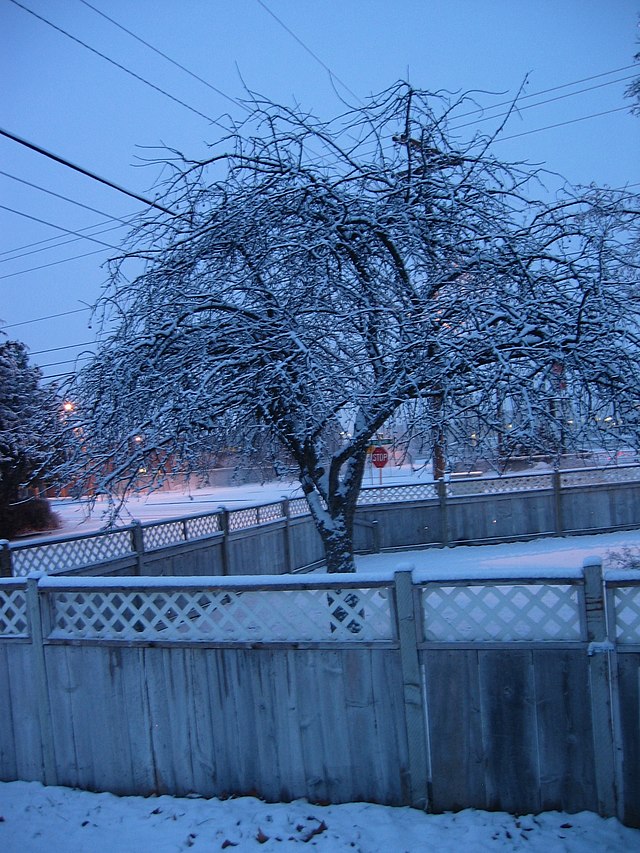Dormancy
state of minimized physical activity of an organism From Wikipedia, the free encyclopedia
Dormancy is a period in an organism's life cycle when growth, development, and (in animals) physical activity are temporarily stopped. This minimizes metabolic activity and therefore helps an organism to conserve energy. Dormancy tends to be closely associated with environmental conditions. Organisms can synchronize entry to a dormant phase with their environment through predictive or consequential means.

Predictive dormancy occurs when an organism enters a dormant phase before the onset of adverse conditions. For example, day length and decreasing temperature are used by many plants as triggers to start dormancy before the onset of winter.
Consequential dormancy occurs when organisms enter a dormant phase after adverse conditions arise. This is often found in areas with an unpredictable climate. Sudden changes in conditions may lead to a high mortality rate among animals relying on consequential dormancy. On the other hand, its use can be advantageous, as organisms remain active longer and are able to make greater use of available resources.
Animals
- Hibernation: Hibernation is a mechanism used by many mammals to save energy and survive food shortage over the winter. Hibernation may be predictive or consequential.
- Diapause: Diapause is a predictive strategy controlled by an animal's genotype. It is common in insects between autumn and spring.
- Aestivation: Aestivation is consequential dormancy in response to very hot or dry conditions. It is common in invertebrates, and also occurs in lungfish, salamanders, desert tortoises, and crocodiles.
- Brumation: Brumation is dormancy in reptiles similar to hibernation.[2] It differs from hibernation in the metabolic processes involved.[3] Reptiles usually start brumation in late autumn. They often wake up to drink water and return to "sleep". They can go for months without food.
Plants
Development from the seed
A seed, though not active, is a tiny living thing. It contains the embryo of the future plant, which is not changing or developing: it is dormant. The common idea is that the seed "sleeps" until it gets what it needs to wake up. That is not correct. Different seeds have different habits, no doubt adapted to their habitat. There are different kinds of resting stages in seeds:[4]
- 1. Seed dormancy: means the seed does not develop for a while even when conditions are suitable.[5]p98 Delayed germination (development) allows time for dispersal. Changes take place inside the seed which sooner or later make it germinate. The details vary hugely between species.
- 2. Seed hibernation: fails to germinate because conditions are not right. Growth is triggered by particular events in the environment. Details of the triggers are known for some, but not all, seeds. Rain, fire, ground temperature, are examples. Many seeds only germinate after they have been eaten and passed through the digestive system of an animal. This also is a dispersal method.
When a seed germinates ("wakes up"), it begins to grow into a little plant called a seedling.[4] It uses the soft fleshy material inside the seed for nutrients (food) until it is ready to make food on its own using sunlight, water and air.
Most seeds germinate underground where there is no sunlight. The plant does not need the nutrients in soil for a few days or weeks, because the seed has all the things it needs to grow.[5] Later, though, it will begin to need sunlight. If there is sunlight, the plant will use it to grow healthy. If there is no light, the plant will still grow for a while, but its plastids will not mature: the chlorophyll does not turn green. If the plant does not get enough light, it will eventually die. It needs light to make food for itself when the reserve in the seed runs out.[4]
- The oldest carbon 14-dated seed that has grown into a plant was a Judean date palm seed about 2,000 years old, recovered from excavations at Herod the Great's palace on Masada in Israel. It was germinated in 2005.[6]
- The largest seed is produced by the Coco de mer, or "double coconut palm", Lodoicea maldivica. The entire fruit may weigh up to 23 kilograms (50 pounds) and usually contains a single seed.[7]
Related pages
References
Wikiwand - on
Seamless Wikipedia browsing. On steroids.
